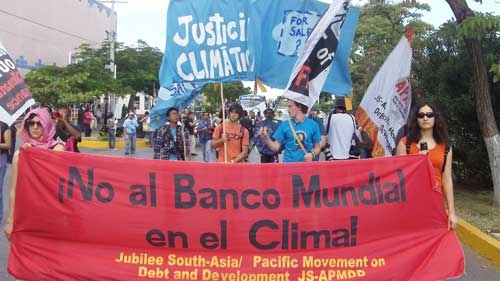World Bank Out of Climate Rally
Today was marked by an intense debate concerning the role of the World Bank in climate change.
World Bank President Robert Zoellick arrived in Cancún to launch a new multi-million dollar fund designed to help developing countries establish their own carbon markets. He also lobbied for a wider role for the bank in administering funds allocated by industrial countries to finance mitigation and adaptation projects in the South.
In front of Cancún’s city hall hundreds of supporters of Jubilee South rallied in opposition to any role for the World Bank.
While the rhetoric of Bank opponents was strong it was far from uninformed. Ricardo Navarro of Friends of the Earth in El Salvador said: “If there’s one institution that we can point to as responsible for climate change, it is the World Bank.” The basis for this statement is the pattern of Bank lending over the years. Between 1992 and 2004 the Bank lent more than US$11 billion for over 120 fossil fuel extraction projects responsible for 20% of today’s greenhouse gas emission.
Hemantha Withanage from the Centre for Environmental Justice in Sri Lanka asked, “How can the climate criminal become the climate saviour?” He was particularly critical of the World Bank’s role in setting up a unit for the financing of carbon trading now worth approximately US$2.5 billion. The carbon market allows industrialized countries to invest in projects in developing countries to earn tradable offsets allowing them to go on burning fossil fuels. A South African member of Jubilee South said that carbon offset projects “are actually a way for the North to purchase rights to pollute our planet.”
Based on the experience so far carbon trading is widely seen as irreparably flawed, subject to fraud and open to loopholes that undermine environmental integrity.
Of the US$7.9 billion allocated to date under the Copenhagen Accord to finance mitigation and adaptation projects in the global South, 42% has been channelled through the World Bank and 47% has been for loans rather than grants. Lidy Nacpil of the Philippine Coalition Against Debt stated: ¨Climate financing should not be based on loans or other options that generate debt. It is already a great injustice that the people in the South have to shoulder the worst of the impacts of a crisis for which they bear no responsibility. Similarly it is unjust that we are forced to pay the cost of dealing with these impacts.”
Reza Choudry from Bangladesh echoed Lidy Nacpil’s remarks saying that his country cannot afford to take on any more debt on top of what is already owed especially when fierce cyclones killed some 4,000 people in 2007 and 2008. Moreover, Bangladesh is “ground zero” for climate change, he said, as there will be as many as 30 million climate migrants by 2050 due to rising sea levels.
An Indonesian activist pointed to how voting power in the World Bank favours the North over the South. He protested that it is unfair that the Northern countries who are responsible for 77% of greenhouse gases in the atmosphere should dictate policies to the peoples of the South. Instead, Northerners should repay the ecological debt they owe to the South, first by reducing their own emissions and secondly by providing grants rather than loans for adaptation and mitigation.
Unfortunately, 72% of the $400 million in climate finance Canada has pledged for 2010 will go to the World Bank’s International Financing Corporation for making loans to private sector companies.
After the speeches we all departed on a short march to Kilometre Zero, which has special meaning for activists because that is where a Korean farmer gave his life in 2003 in protest against the neo-liberal policies of the World Trade Organization, a sister institution to the World Bank. I was given the honour of carrying part of a large puppet depicting the World Bank.
When we arrived three people from Bangladesh, Haiti and the Dominican Republic were handed sticks to smash a piñata in the shape of a piggy bank depicting the World Bank. Out poured not candy but fake two-dollar bills that were later burned as people shouted slogans against taking money from an institution seen as responsible for their poverty and ecological devastation due to years of Structural Adjustment Programs. The preferred alternative is for funds to be administered by the United Nations itself.
John Dillon
Cancún, December 8, 2010




